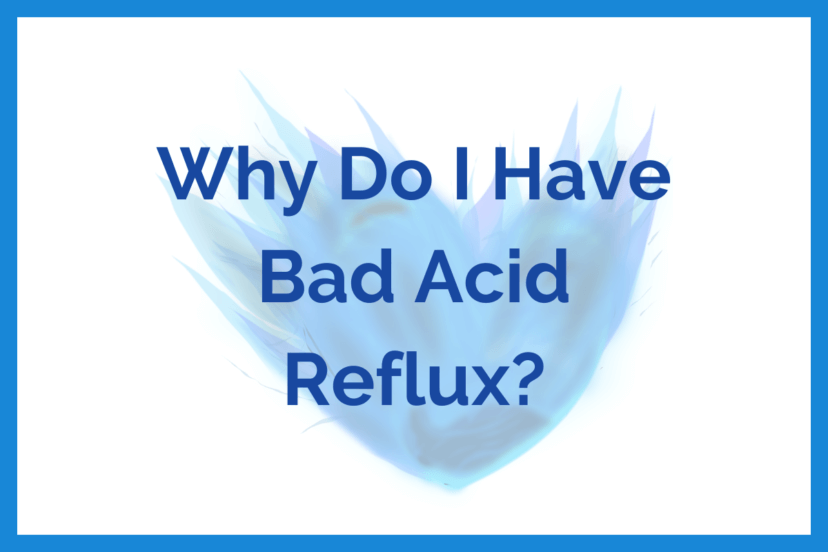Why Do I Have Bad Acid Reflux?
Table of Contents
Introduction – Why Do I Have Bad Acid Reflux?
Acid reflux, also known as gastroesophageal reflux disease (GERD), is a common condition where stomach acid frequently flows back up into the esophagus. This backflow of acid can irritate the lining of the esophagus, causing symptoms like heartburn, regurgitation, and chest pain. If you’re dealing with bad acid reflux, you’re probably wondering – why do I have this problem? There are several potential causes, from lifestyle factors to underlying medical conditions. The good news is there are also many ways to manage acid reflux through diet, lifestyle changes, and medications.
What is Acid Reflux?
Acid reflux occurs when a ring of muscle at the bottom of the esophagus called the lower esophageal sphincter (LES) relaxes or weakens, allowing stomach contents to flow upward into the esophagus. The LES is supposed to act as a one-way valve between the esophagus and stomach, only opening when you swallow to let food down. With acid reflux, this valve opens too easily or does not close properly, allowing gastric acid to reflux into the esophagus. This acid can irritate the esophageal lining and cause uncomfortable symptoms.
Common Causes of Acid Reflux
There are several factors that can contribute to acid reflux and cause you to have bad flare-ups:
Eating Habits
Eating large, heavy meals puts extra pressure on the LES, forcing it open and allowing acid to reflux. Eating fatty, fried, and spicy foods can also relax the LES and trigger reflux. Lying down soon after eating makes it easier for acid to back up into the esophagus.
Lifestyle Factors
Being overweight or obese increases abdominal pressure, which can force open the LES. Smoking weakens the LES and saliva production, increasing reflux. Excessive alcohol use also relaxes the LES. Even stress can increase acid production in the stomach.
Medical Conditions
Some underlying conditions make acid reflux more likely, including hiatal hernia, pregnancy, and diabetes. Some medications, like asthma inhalers, blood pressure drugs, and certain pain relievers can also exacerbate reflux.
Symptoms of Acid Reflux
Frequent acid reflux can cause uncomfortable symptoms, including:
Heartburn
A burning pain or discomfort behind the breastbone, usually after eating. It can feel sharp and biting or dull and aching. It may worsen when lying down.
Regurgitation
A bitter or sour taste in the mouth as stomach contents back up into the throat. You may experience a wet burp or belch and taste acidic or bitter fluid.
Difficulty Swallowing
Known as dysphagia, this symptom makes eating solid foods feel difficult. Food may feel like it’s sticking in the chest or throat.
Chest Pain
A heavy, squeezing sensation, often confused with heart-related chest pain. It usually subsides with antacids.

When to See a Doctor
Occasional mild acid reflux after meals is normal. But frequent, severe symptoms could indicate GERD or other complications. See a doctor if you have:
- Pain that is persistent or severe
- Difficulty swallowing that persists
- Unexplained weight loss
- Vomiting or coughing up blood
- Hoarseness lasting over two weeks
Your doctor can help determine if your reflux is caused by an underlying condition and recommend appropriate treatment.
This page provides comprehensive information on Gastroesophageal reflux disease (GERD), its symptoms, causes, and treatments: https://www.mayoclinic.org/diseases-conditions/gerd/symptoms-causes/syc-20361940
Lifestyle Changes to Help Acid Reflux
Certain lifestyle modifications can go a long way towards controlling acid reflux:
Diet Modifications
Avoid trigger foods, large portions, and late-night eating. Eat smaller, more frequent meals. Raise the head of your bed and avoid lying down right after meals.
Weight Loss
Losing extra weight takes pressure off the LES to help mitigate reflux.
Quit Smoking
Smoking weakens the LES and increases acid production. Quitting can significantly improve reflux.
Manage Stress
Stress aggravates acid reflux symptoms. Try relaxation techniques like yoga, meditation, or deep breathing.
Over-the-Counter Medications
Several OTC medications can temporarily relieve acid reflux discomfort:
- Antacids neutralize stomach acid and provide quick symptom relief.
- H2 blockers reduce acid production for longer-lasting relief.
- Proton pump inhibitors (PPIs) block acid production for up to 24 hours.
Use OTC medications only occasionally unless directed by your doctor.
Prescription Medications
If OTC medications don’t help enough, your doctor may prescribe stronger prescription medications, including:
- Stronger PPIs to severely limit acid production
- Prokinetics to help tighten the LES and improve stomach emptying
- Baclofen to reduce reflux by relaxing the LES
- Surgery if medications are ineffective
Conclusion
If you’ve been asking yourself, “Why Do I Have Bad Acid Reflux?”. You’ll realise that acid reflux is often caused by lifestyle factors like diet, obesity, smoking, and stress. Making dietary and behavior changes can help control symptoms in many cases. OTC or prescription medications may be needed for more persistent cases. See your doctor if lifestyle changes and OTC medications don’t provide enough relief. With the right treatment approach, you can manage acid reflux and enjoy mealtimes again.
FAQs
What foods make acid reflux worse?
Spicy, fried, and fatty foods, citrus fruits, tomatoes, garlic, onions, chocolate, coffee, and alcohol can make acid reflux worse.
Does stress cause acid reflux?
Yes, stress aggravates acid reflux by increasing stomach acid production. Managing stress through relaxation techniques can help.
Can acid reflux be a sign of something serious?
Frequent and severe acid reflux can sometimes indicate complications like GERD or Barrett’s esophagus. See your doctor if symptoms persist.
What is the best medication for acid reflux?
Over-the-counter antacids and medications like famotidine (Pepcid) or omeprazole (Prilosec) are generally effective for most cases of acid reflux.
When should I see a doctor for acid reflux?
See your doctor if symptoms persist despite lifestyle changes and OTC medications. Also see a doctor for severe pain, trouble swallowing, vomiting blood, or unexplained weight loss.




